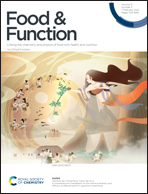Influence of the particle size of encapsulated chia oil on the oil release and bioaccessibility during in vitro gastrointestinal digestion†
Abstract
Among vegetable oils, chia oil has been gaining interest in recent years due to its high linolenic acid content (ALA, 18:3 ω3). The aim of this work was to study the influence of the particle size of encapsulated purified chia oil (PCO) on the encapsulation efficiency and PCO release during in vitro digestion. PCO micro- and nano-sized particles with sodium alginate (SA) as an encapsulating agent (ME-PCO-SA and NE-PCO-SA) were designed by micro and nano spray-drying, respectively, applying a central composite plus star point experimental design. NE-PCO-SA showed a smaller particle size and higher encapsulation efficiency of PCO than ME-PCO-SA (0.16 μm vs. 3.5 μm; 98.1% vs. 92.0%). Emulsions (NE-PCO and ME-PCO) and particles (NE-PCO-SA and ME-PCO-SA) were subjected to in vitro static gastrointestinal digestion. ME-PCO and NE-PCO showed sustained oil release throughout the three phases of digestion (oral, gastric and intestinal phases), whereas the PCO release from ME-PCO-SA and NE-PCO-SA occurred mainly in the intestinal phase, showing the suitability of sodium alginate as an intestine-site release polymer. Nano-sized particles showed a significantly higher PCO release after in vitro digestion (NE-PCO-SA, 78.4%) than micro-sized particles (ME-PCO-SA, 69.8%), and also higher bioaccessibility of individual free fatty acids, such as C18:3 ω-3 (NE-PCO-SA, 23.6%; ME-PCO-SA, 7.9%), due to their greater surface area. However, when ME-PCO-SA and NE-PCO-SA were incorporated into yogurt, the PCO release from both particle systems after the digestion of the matrix was similar (NE-PCO-SA, 58.8%; ME-PCO-SA-Y, 61.8%), possibly because the calcium ions contained in the yogurt induced partial ionic gelation of SA, impairing the PCO release. Sodium alginate spray-dried micro and nanoparticles showed great potential for vehiculation of omega-3 rich oils in the design of functional foods.

- This article is part of the themed collection: Food & Function HOT Articles 2022


 Please wait while we load your content...
Please wait while we load your content...